Essay: Ethical Issues and Critical Reflexivity in Social Work
VerifiedAdded on 2023/03/17
|13
|3860
|64
Essay
AI Summary
This essay presents the student's emerging philosophy of social work, emphasizing the crucial link between philosophy, theory, and practice. The paper delves into key concepts such as empathy, empowerment, integrity, equality, confidentiality, and dignity, demonstrating how each element contributes to social cohesion. It addresses the ethical challenges faced by social workers, while providing a comprehensive overview of the core values essential to effective social work. The discussion incorporates various levels of empathy (affective, cognitive, and somatic), different forms of empowerment (economic, political, educational, and societal), and the importance of integrity, equality, confidentiality, and dignity in fostering positive social relationships and promoting ethical practice. The essay aims to provide a detailed understanding of how these concepts can enhance social cohesion and address the challenges faced by social workers in the community.
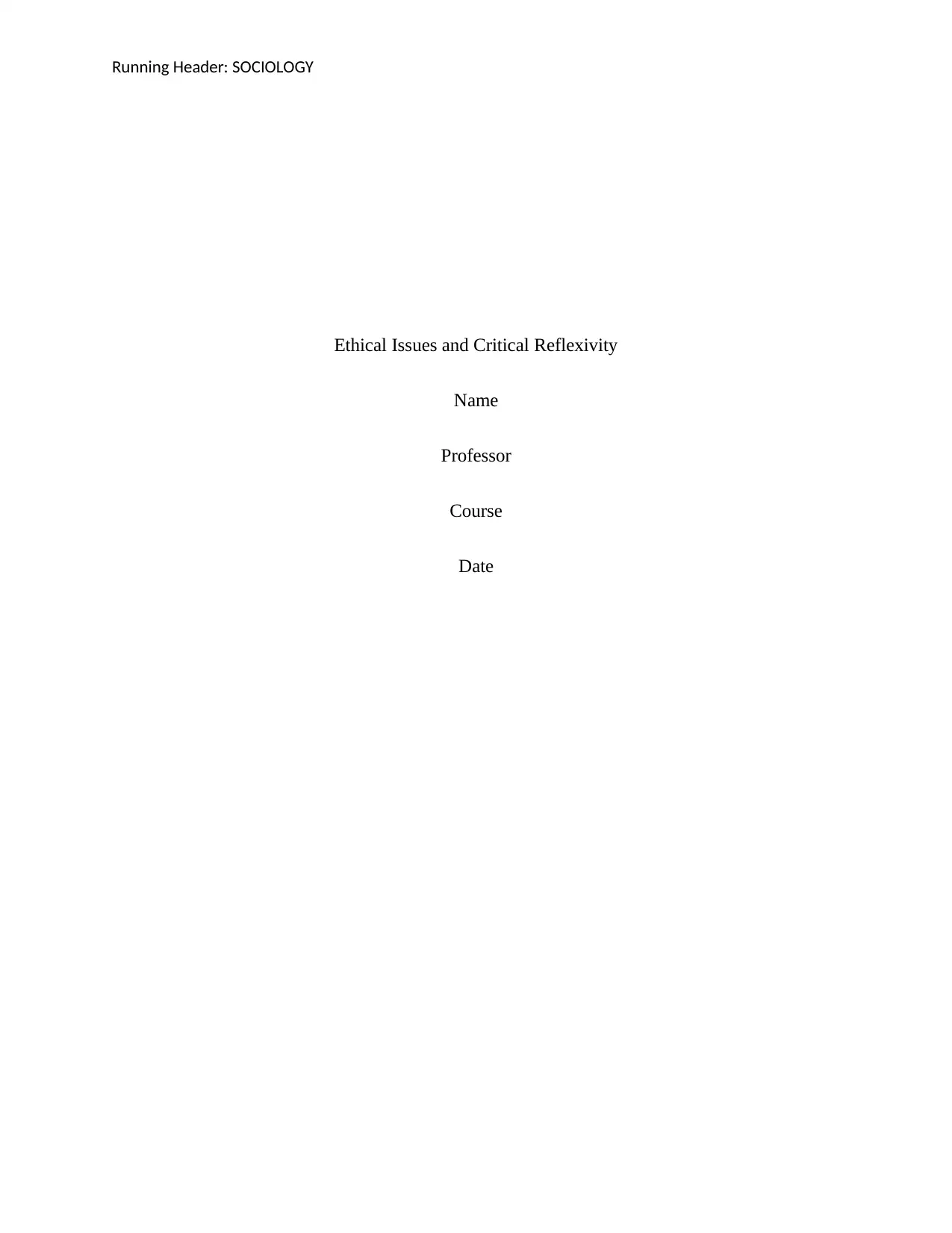
Running Header: SOCIOLOGY
Ethical Issues and Critical Reflexivity
Name
Professor
Course
Date
Ethical Issues and Critical Reflexivity
Name
Professor
Course
Date
Paraphrase This Document
Need a fresh take? Get an instant paraphrase of this document with our AI Paraphraser
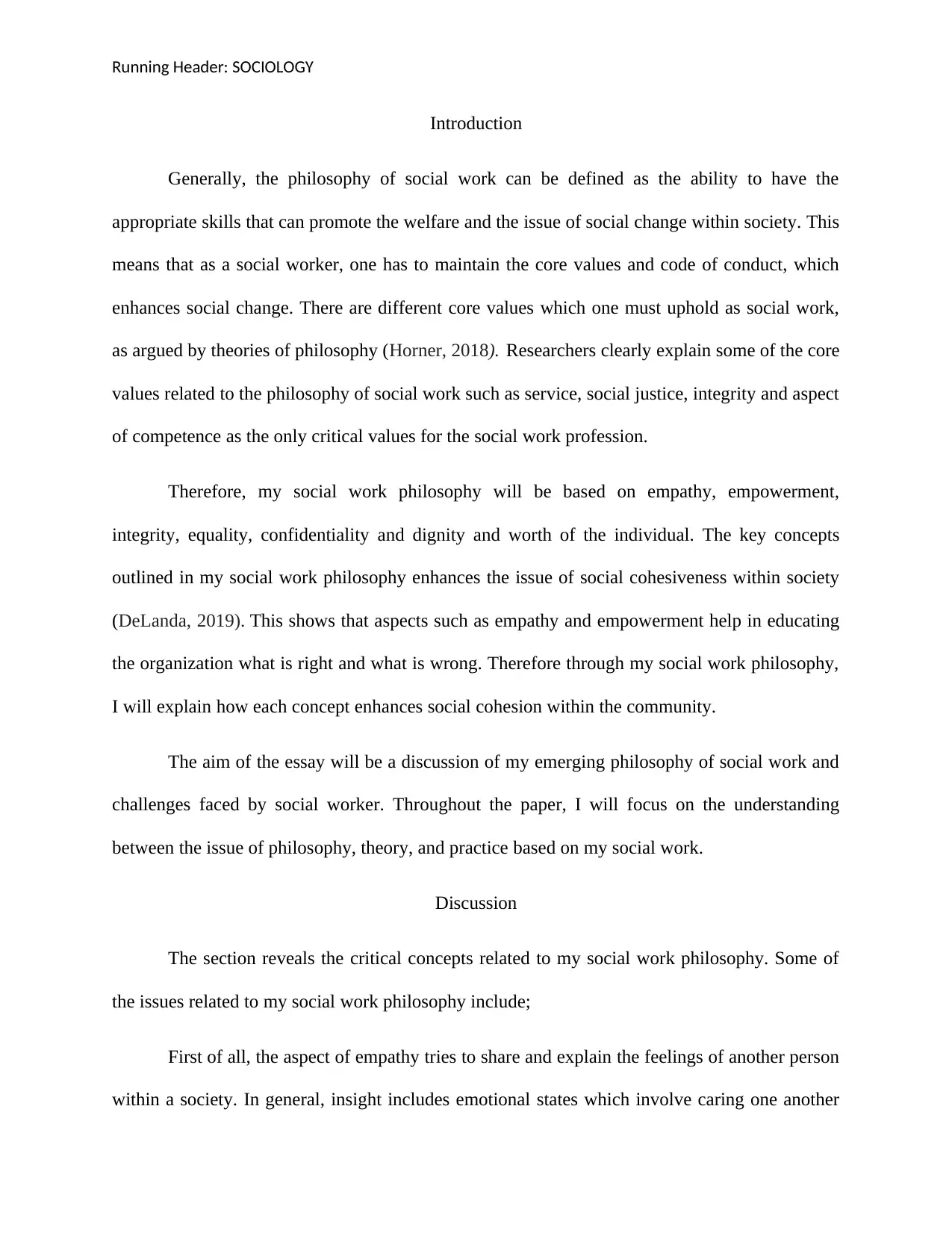
Running Header: SOCIOLOGY
Introduction
Generally, the philosophy of social work can be defined as the ability to have the
appropriate skills that can promote the welfare and the issue of social change within society. This
means that as a social worker, one has to maintain the core values and code of conduct, which
enhances social change. There are different core values which one must uphold as social work,
as argued by theories of philosophy (Horner, 2018). Researchers clearly explain some of the core
values related to the philosophy of social work such as service, social justice, integrity and aspect
of competence as the only critical values for the social work profession.
Therefore, my social work philosophy will be based on empathy, empowerment,
integrity, equality, confidentiality and dignity and worth of the individual. The key concepts
outlined in my social work philosophy enhances the issue of social cohesiveness within society
(DeLanda, 2019). This shows that aspects such as empathy and empowerment help in educating
the organization what is right and what is wrong. Therefore through my social work philosophy,
I will explain how each concept enhances social cohesion within the community.
The aim of the essay will be a discussion of my emerging philosophy of social work and
challenges faced by social worker. Throughout the paper, I will focus on the understanding
between the issue of philosophy, theory, and practice based on my social work.
Discussion
The section reveals the critical concepts related to my social work philosophy. Some of
the issues related to my social work philosophy include;
First of all, the aspect of empathy tries to share and explain the feelings of another person
within a society. In general, insight includes emotional states which involve caring one another
Introduction
Generally, the philosophy of social work can be defined as the ability to have the
appropriate skills that can promote the welfare and the issue of social change within society. This
means that as a social worker, one has to maintain the core values and code of conduct, which
enhances social change. There are different core values which one must uphold as social work,
as argued by theories of philosophy (Horner, 2018). Researchers clearly explain some of the core
values related to the philosophy of social work such as service, social justice, integrity and aspect
of competence as the only critical values for the social work profession.
Therefore, my social work philosophy will be based on empathy, empowerment,
integrity, equality, confidentiality and dignity and worth of the individual. The key concepts
outlined in my social work philosophy enhances the issue of social cohesiveness within society
(DeLanda, 2019). This shows that aspects such as empathy and empowerment help in educating
the organization what is right and what is wrong. Therefore through my social work philosophy,
I will explain how each concept enhances social cohesion within the community.
The aim of the essay will be a discussion of my emerging philosophy of social work and
challenges faced by social worker. Throughout the paper, I will focus on the understanding
between the issue of philosophy, theory, and practice based on my social work.
Discussion
The section reveals the critical concepts related to my social work philosophy. Some of
the issues related to my social work philosophy include;
First of all, the aspect of empathy tries to share and explain the feelings of another person
within a society. In general, insight includes emotional states which involve caring one another
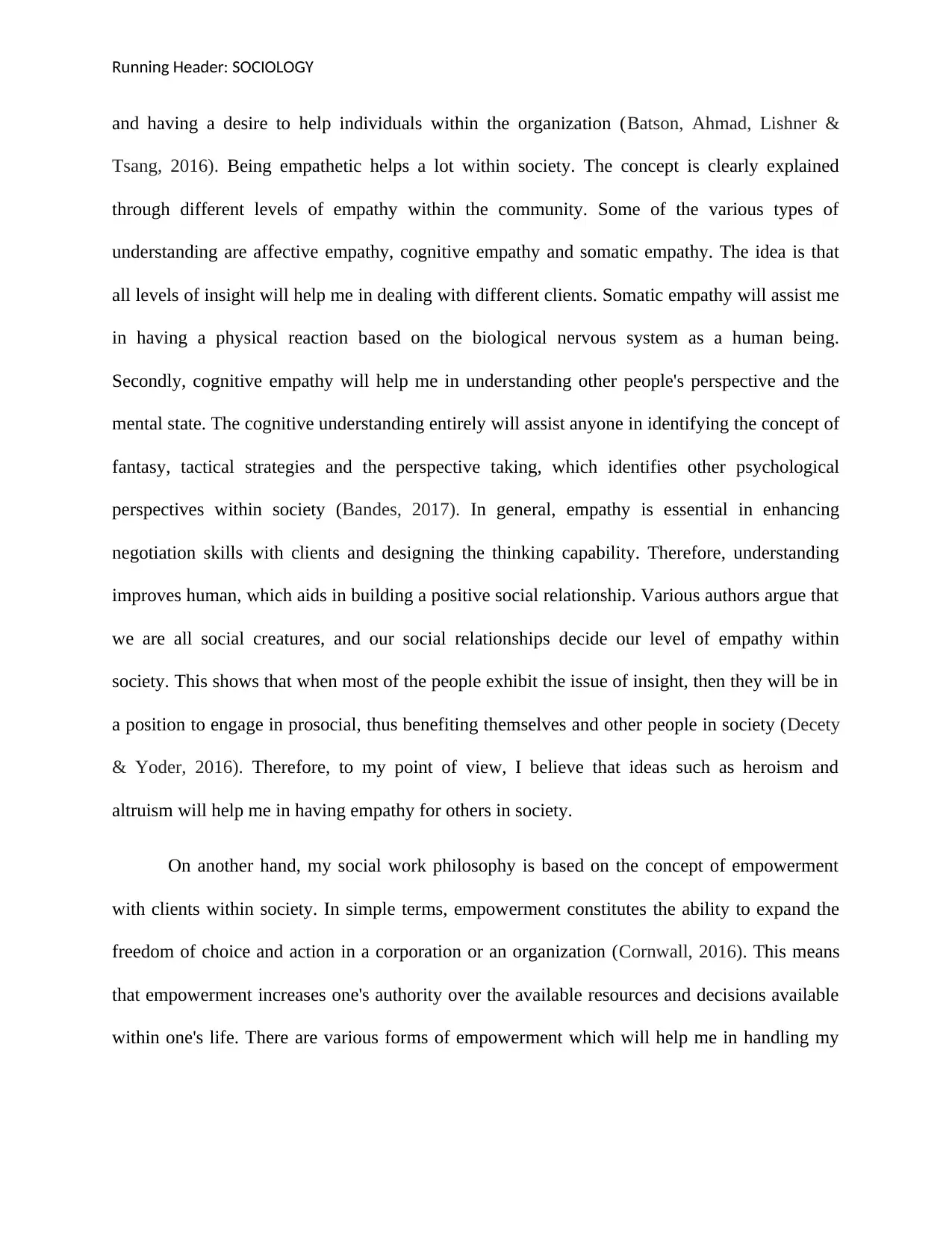
Running Header: SOCIOLOGY
and having a desire to help individuals within the organization (Batson, Ahmad, Lishner &
Tsang, 2016). Being empathetic helps a lot within society. The concept is clearly explained
through different levels of empathy within the community. Some of the various types of
understanding are affective empathy, cognitive empathy and somatic empathy. The idea is that
all levels of insight will help me in dealing with different clients. Somatic empathy will assist me
in having a physical reaction based on the biological nervous system as a human being.
Secondly, cognitive empathy will help me in understanding other people's perspective and the
mental state. The cognitive understanding entirely will assist anyone in identifying the concept of
fantasy, tactical strategies and the perspective taking, which identifies other psychological
perspectives within society (Bandes, 2017). In general, empathy is essential in enhancing
negotiation skills with clients and designing the thinking capability. Therefore, understanding
improves human, which aids in building a positive social relationship. Various authors argue that
we are all social creatures, and our social relationships decide our level of empathy within
society. This shows that when most of the people exhibit the issue of insight, then they will be in
a position to engage in prosocial, thus benefiting themselves and other people in society (Decety
& Yoder, 2016). Therefore, to my point of view, I believe that ideas such as heroism and
altruism will help me in having empathy for others in society.
On another hand, my social work philosophy is based on the concept of empowerment
with clients within society. In simple terms, empowerment constitutes the ability to expand the
freedom of choice and action in a corporation or an organization (Cornwall, 2016). This means
that empowerment increases one's authority over the available resources and decisions available
within one's life. There are various forms of empowerment which will help me in handling my
and having a desire to help individuals within the organization (Batson, Ahmad, Lishner &
Tsang, 2016). Being empathetic helps a lot within society. The concept is clearly explained
through different levels of empathy within the community. Some of the various types of
understanding are affective empathy, cognitive empathy and somatic empathy. The idea is that
all levels of insight will help me in dealing with different clients. Somatic empathy will assist me
in having a physical reaction based on the biological nervous system as a human being.
Secondly, cognitive empathy will help me in understanding other people's perspective and the
mental state. The cognitive understanding entirely will assist anyone in identifying the concept of
fantasy, tactical strategies and the perspective taking, which identifies other psychological
perspectives within society (Bandes, 2017). In general, empathy is essential in enhancing
negotiation skills with clients and designing the thinking capability. Therefore, understanding
improves human, which aids in building a positive social relationship. Various authors argue that
we are all social creatures, and our social relationships decide our level of empathy within
society. This shows that when most of the people exhibit the issue of insight, then they will be in
a position to engage in prosocial, thus benefiting themselves and other people in society (Decety
& Yoder, 2016). Therefore, to my point of view, I believe that ideas such as heroism and
altruism will help me in having empathy for others in society.
On another hand, my social work philosophy is based on the concept of empowerment
with clients within society. In simple terms, empowerment constitutes the ability to expand the
freedom of choice and action in a corporation or an organization (Cornwall, 2016). This means
that empowerment increases one's authority over the available resources and decisions available
within one's life. There are various forms of empowerment which will help me in handling my
⊘ This is a preview!⊘
Do you want full access?
Subscribe today to unlock all pages.

Trusted by 1+ million students worldwide
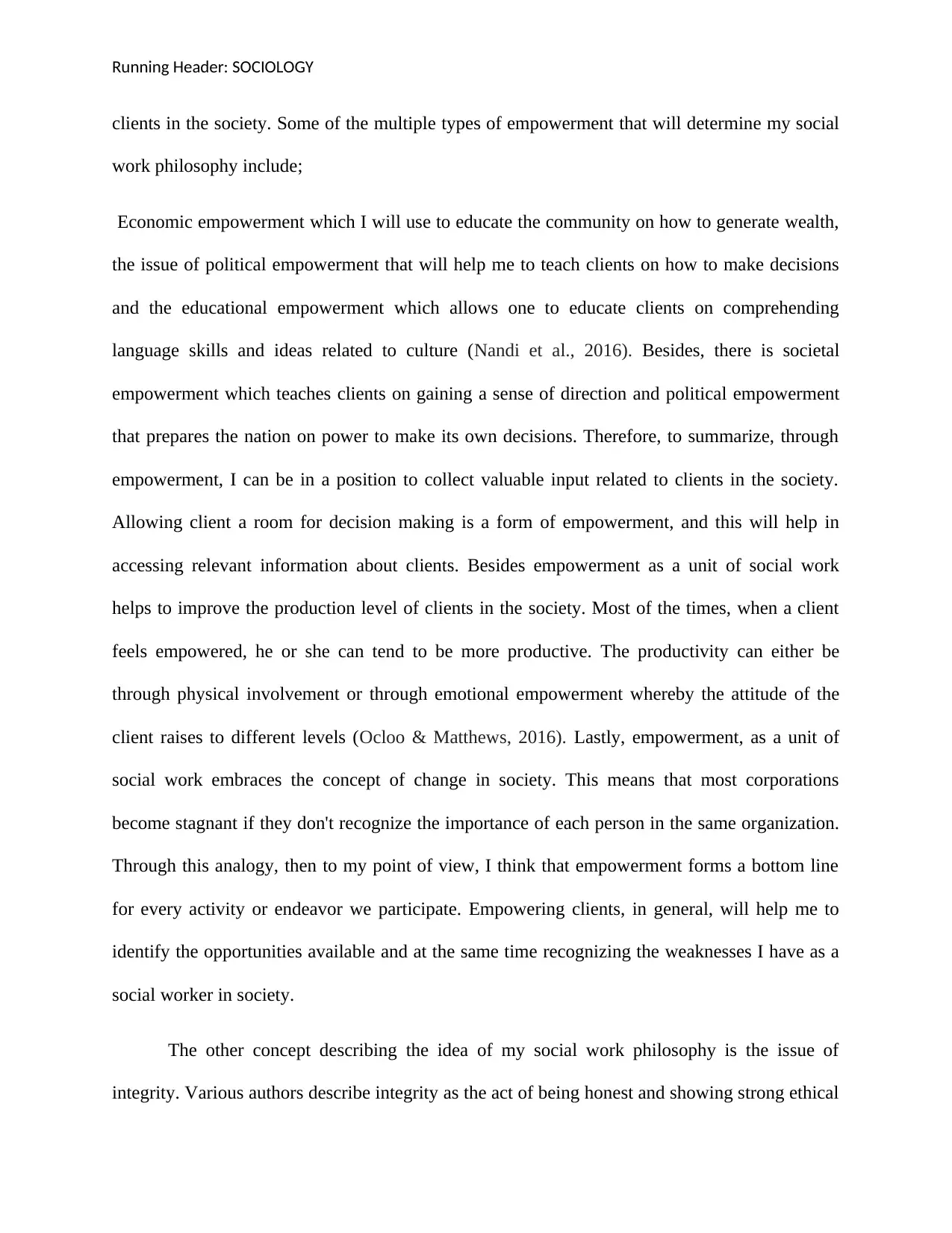
Running Header: SOCIOLOGY
clients in the society. Some of the multiple types of empowerment that will determine my social
work philosophy include;
Economic empowerment which I will use to educate the community on how to generate wealth,
the issue of political empowerment that will help me to teach clients on how to make decisions
and the educational empowerment which allows one to educate clients on comprehending
language skills and ideas related to culture (Nandi et al., 2016). Besides, there is societal
empowerment which teaches clients on gaining a sense of direction and political empowerment
that prepares the nation on power to make its own decisions. Therefore, to summarize, through
empowerment, I can be in a position to collect valuable input related to clients in the society.
Allowing client a room for decision making is a form of empowerment, and this will help in
accessing relevant information about clients. Besides empowerment as a unit of social work
helps to improve the production level of clients in the society. Most of the times, when a client
feels empowered, he or she can tend to be more productive. The productivity can either be
through physical involvement or through emotional empowerment whereby the attitude of the
client raises to different levels (Ocloo & Matthews, 2016). Lastly, empowerment, as a unit of
social work embraces the concept of change in society. This means that most corporations
become stagnant if they don't recognize the importance of each person in the same organization.
Through this analogy, then to my point of view, I think that empowerment forms a bottom line
for every activity or endeavor we participate. Empowering clients, in general, will help me to
identify the opportunities available and at the same time recognizing the weaknesses I have as a
social worker in society.
The other concept describing the idea of my social work philosophy is the issue of
integrity. Various authors describe integrity as the act of being honest and showing strong ethical
clients in the society. Some of the multiple types of empowerment that will determine my social
work philosophy include;
Economic empowerment which I will use to educate the community on how to generate wealth,
the issue of political empowerment that will help me to teach clients on how to make decisions
and the educational empowerment which allows one to educate clients on comprehending
language skills and ideas related to culture (Nandi et al., 2016). Besides, there is societal
empowerment which teaches clients on gaining a sense of direction and political empowerment
that prepares the nation on power to make its own decisions. Therefore, to summarize, through
empowerment, I can be in a position to collect valuable input related to clients in the society.
Allowing client a room for decision making is a form of empowerment, and this will help in
accessing relevant information about clients. Besides empowerment as a unit of social work
helps to improve the production level of clients in the society. Most of the times, when a client
feels empowered, he or she can tend to be more productive. The productivity can either be
through physical involvement or through emotional empowerment whereby the attitude of the
client raises to different levels (Ocloo & Matthews, 2016). Lastly, empowerment, as a unit of
social work embraces the concept of change in society. This means that most corporations
become stagnant if they don't recognize the importance of each person in the same organization.
Through this analogy, then to my point of view, I think that empowerment forms a bottom line
for every activity or endeavor we participate. Empowering clients, in general, will help me to
identify the opportunities available and at the same time recognizing the weaknesses I have as a
social worker in society.
The other concept describing the idea of my social work philosophy is the issue of
integrity. Various authors describe integrity as the act of being honest and showing strong ethical
Paraphrase This Document
Need a fresh take? Get an instant paraphrase of this document with our AI Paraphraser
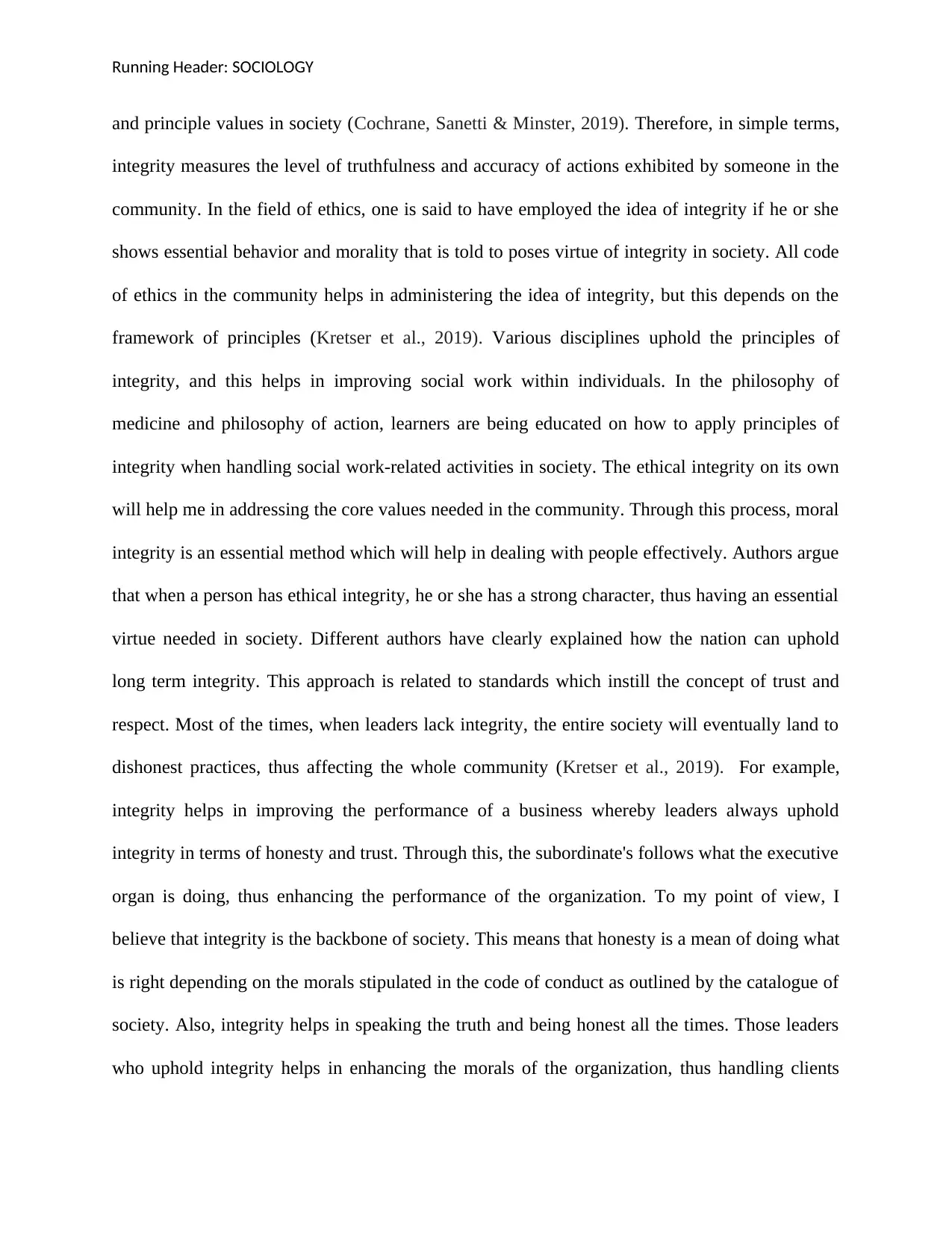
Running Header: SOCIOLOGY
and principle values in society (Cochrane, Sanetti & Minster, 2019). Therefore, in simple terms,
integrity measures the level of truthfulness and accuracy of actions exhibited by someone in the
community. In the field of ethics, one is said to have employed the idea of integrity if he or she
shows essential behavior and morality that is told to poses virtue of integrity in society. All code
of ethics in the community helps in administering the idea of integrity, but this depends on the
framework of principles (Kretser et al., 2019). Various disciplines uphold the principles of
integrity, and this helps in improving social work within individuals. In the philosophy of
medicine and philosophy of action, learners are being educated on how to apply principles of
integrity when handling social work-related activities in society. The ethical integrity on its own
will help me in addressing the core values needed in the community. Through this process, moral
integrity is an essential method which will help in dealing with people effectively. Authors argue
that when a person has ethical integrity, he or she has a strong character, thus having an essential
virtue needed in society. Different authors have clearly explained how the nation can uphold
long term integrity. This approach is related to standards which instill the concept of trust and
respect. Most of the times, when leaders lack integrity, the entire society will eventually land to
dishonest practices, thus affecting the whole community (Kretser et al., 2019). For example,
integrity helps in improving the performance of a business whereby leaders always uphold
integrity in terms of honesty and trust. Through this, the subordinate's follows what the executive
organ is doing, thus enhancing the performance of the organization. To my point of view, I
believe that integrity is the backbone of society. This means that honesty is a mean of doing what
is right depending on the morals stipulated in the code of conduct as outlined by the catalogue of
society. Also, integrity helps in speaking the truth and being honest all the times. Those leaders
who uphold integrity helps in enhancing the morals of the organization, thus handling clients
and principle values in society (Cochrane, Sanetti & Minster, 2019). Therefore, in simple terms,
integrity measures the level of truthfulness and accuracy of actions exhibited by someone in the
community. In the field of ethics, one is said to have employed the idea of integrity if he or she
shows essential behavior and morality that is told to poses virtue of integrity in society. All code
of ethics in the community helps in administering the idea of integrity, but this depends on the
framework of principles (Kretser et al., 2019). Various disciplines uphold the principles of
integrity, and this helps in improving social work within individuals. In the philosophy of
medicine and philosophy of action, learners are being educated on how to apply principles of
integrity when handling social work-related activities in society. The ethical integrity on its own
will help me in addressing the core values needed in the community. Through this process, moral
integrity is an essential method which will help in dealing with people effectively. Authors argue
that when a person has ethical integrity, he or she has a strong character, thus having an essential
virtue needed in society. Different authors have clearly explained how the nation can uphold
long term integrity. This approach is related to standards which instill the concept of trust and
respect. Most of the times, when leaders lack integrity, the entire society will eventually land to
dishonest practices, thus affecting the whole community (Kretser et al., 2019). For example,
integrity helps in improving the performance of a business whereby leaders always uphold
integrity in terms of honesty and trust. Through this, the subordinate's follows what the executive
organ is doing, thus enhancing the performance of the organization. To my point of view, I
believe that integrity is the backbone of society. This means that honesty is a mean of doing what
is right depending on the morals stipulated in the code of conduct as outlined by the catalogue of
society. Also, integrity helps in speaking the truth and being honest all the times. Those leaders
who uphold integrity helps in enhancing the morals of the organization, thus handling clients
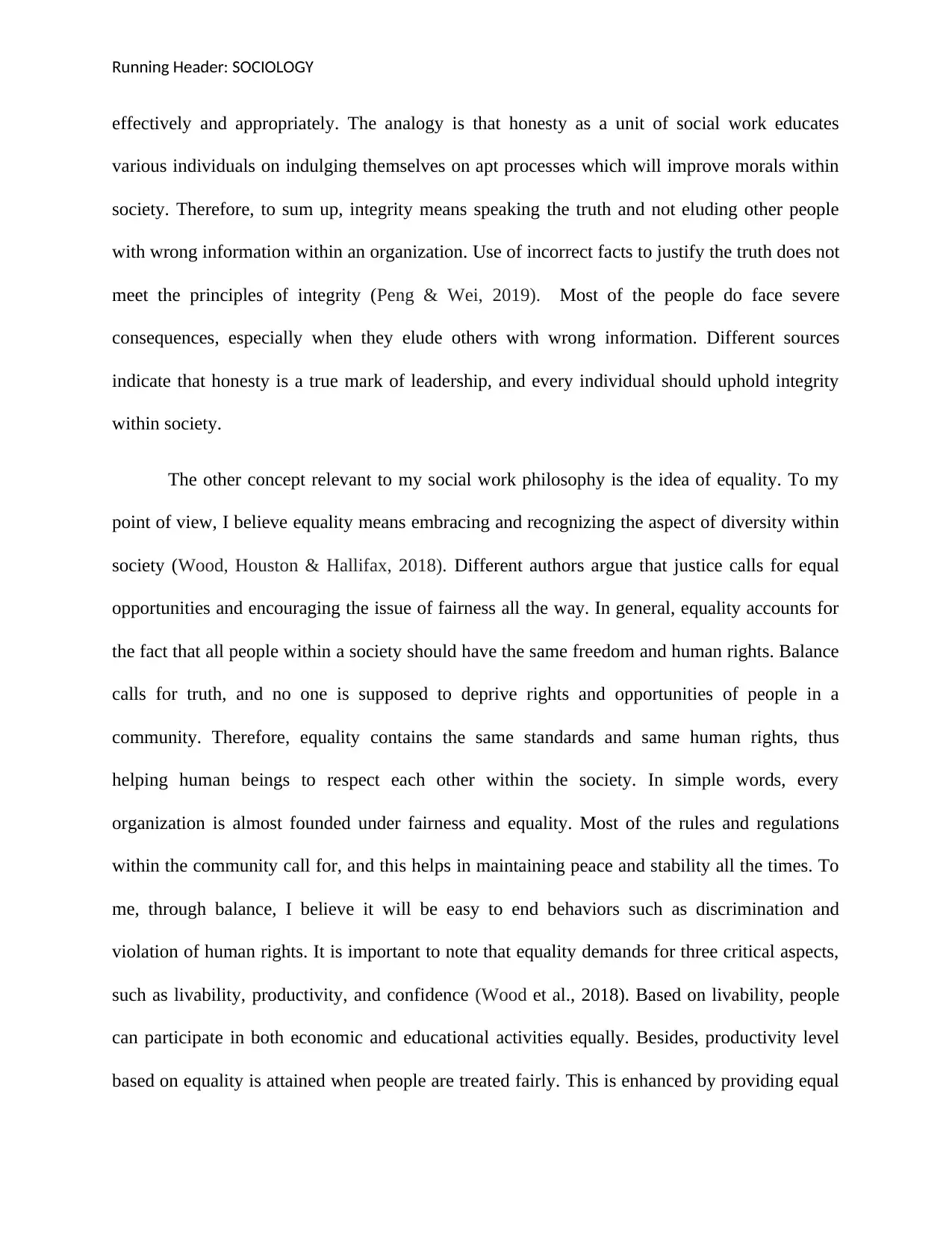
Running Header: SOCIOLOGY
effectively and appropriately. The analogy is that honesty as a unit of social work educates
various individuals on indulging themselves on apt processes which will improve morals within
society. Therefore, to sum up, integrity means speaking the truth and not eluding other people
with wrong information within an organization. Use of incorrect facts to justify the truth does not
meet the principles of integrity (Peng & Wei, 2019). Most of the people do face severe
consequences, especially when they elude others with wrong information. Different sources
indicate that honesty is a true mark of leadership, and every individual should uphold integrity
within society.
The other concept relevant to my social work philosophy is the idea of equality. To my
point of view, I believe equality means embracing and recognizing the aspect of diversity within
society (Wood, Houston & Hallifax, 2018). Different authors argue that justice calls for equal
opportunities and encouraging the issue of fairness all the way. In general, equality accounts for
the fact that all people within a society should have the same freedom and human rights. Balance
calls for truth, and no one is supposed to deprive rights and opportunities of people in a
community. Therefore, equality contains the same standards and same human rights, thus
helping human beings to respect each other within the society. In simple words, every
organization is almost founded under fairness and equality. Most of the rules and regulations
within the community call for, and this helps in maintaining peace and stability all the times. To
me, through balance, I believe it will be easy to end behaviors such as discrimination and
violation of human rights. It is important to note that equality demands for three critical aspects,
such as livability, productivity, and confidence (Wood et al., 2018). Based on livability, people
can participate in both economic and educational activities equally. Besides, productivity level
based on equality is attained when people are treated fairly. This is enhanced by providing equal
effectively and appropriately. The analogy is that honesty as a unit of social work educates
various individuals on indulging themselves on apt processes which will improve morals within
society. Therefore, to sum up, integrity means speaking the truth and not eluding other people
with wrong information within an organization. Use of incorrect facts to justify the truth does not
meet the principles of integrity (Peng & Wei, 2019). Most of the people do face severe
consequences, especially when they elude others with wrong information. Different sources
indicate that honesty is a true mark of leadership, and every individual should uphold integrity
within society.
The other concept relevant to my social work philosophy is the idea of equality. To my
point of view, I believe equality means embracing and recognizing the aspect of diversity within
society (Wood, Houston & Hallifax, 2018). Different authors argue that justice calls for equal
opportunities and encouraging the issue of fairness all the way. In general, equality accounts for
the fact that all people within a society should have the same freedom and human rights. Balance
calls for truth, and no one is supposed to deprive rights and opportunities of people in a
community. Therefore, equality contains the same standards and same human rights, thus
helping human beings to respect each other within the society. In simple words, every
organization is almost founded under fairness and equality. Most of the rules and regulations
within the community call for, and this helps in maintaining peace and stability all the times. To
me, through balance, I believe it will be easy to end behaviors such as discrimination and
violation of human rights. It is important to note that equality demands for three critical aspects,
such as livability, productivity, and confidence (Wood et al., 2018). Based on livability, people
can participate in both economic and educational activities equally. Besides, productivity level
based on equality is attained when people are treated fairly. This is enhanced by providing equal
⊘ This is a preview!⊘
Do you want full access?
Subscribe today to unlock all pages.

Trusted by 1+ million students worldwide
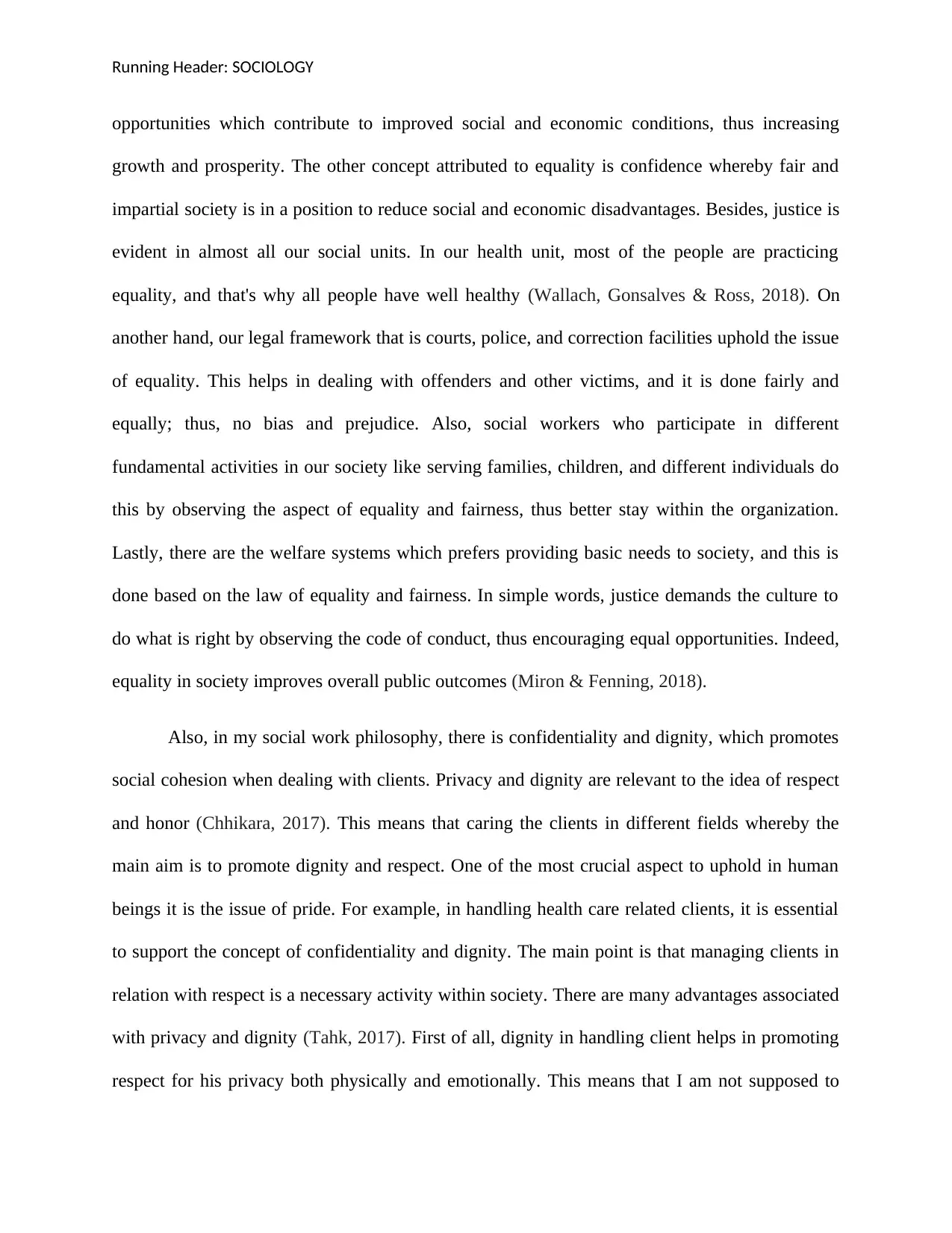
Running Header: SOCIOLOGY
opportunities which contribute to improved social and economic conditions, thus increasing
growth and prosperity. The other concept attributed to equality is confidence whereby fair and
impartial society is in a position to reduce social and economic disadvantages. Besides, justice is
evident in almost all our social units. In our health unit, most of the people are practicing
equality, and that's why all people have well healthy (Wallach, Gonsalves & Ross, 2018). On
another hand, our legal framework that is courts, police, and correction facilities uphold the issue
of equality. This helps in dealing with offenders and other victims, and it is done fairly and
equally; thus, no bias and prejudice. Also, social workers who participate in different
fundamental activities in our society like serving families, children, and different individuals do
this by observing the aspect of equality and fairness, thus better stay within the organization.
Lastly, there are the welfare systems which prefers providing basic needs to society, and this is
done based on the law of equality and fairness. In simple words, justice demands the culture to
do what is right by observing the code of conduct, thus encouraging equal opportunities. Indeed,
equality in society improves overall public outcomes (Miron & Fenning, 2018).
Also, in my social work philosophy, there is confidentiality and dignity, which promotes
social cohesion when dealing with clients. Privacy and dignity are relevant to the idea of respect
and honor (Chhikara, 2017). This means that caring the clients in different fields whereby the
main aim is to promote dignity and respect. One of the most crucial aspect to uphold in human
beings it is the issue of pride. For example, in handling health care related clients, it is essential
to support the concept of confidentiality and dignity. The main point is that managing clients in
relation with respect is a necessary activity within society. There are many advantages associated
with privacy and dignity (Tahk, 2017). First of all, dignity in handling client helps in promoting
respect for his privacy both physically and emotionally. This means that I am not supposed to
opportunities which contribute to improved social and economic conditions, thus increasing
growth and prosperity. The other concept attributed to equality is confidence whereby fair and
impartial society is in a position to reduce social and economic disadvantages. Besides, justice is
evident in almost all our social units. In our health unit, most of the people are practicing
equality, and that's why all people have well healthy (Wallach, Gonsalves & Ross, 2018). On
another hand, our legal framework that is courts, police, and correction facilities uphold the issue
of equality. This helps in dealing with offenders and other victims, and it is done fairly and
equally; thus, no bias and prejudice. Also, social workers who participate in different
fundamental activities in our society like serving families, children, and different individuals do
this by observing the aspect of equality and fairness, thus better stay within the organization.
Lastly, there are the welfare systems which prefers providing basic needs to society, and this is
done based on the law of equality and fairness. In simple words, justice demands the culture to
do what is right by observing the code of conduct, thus encouraging equal opportunities. Indeed,
equality in society improves overall public outcomes (Miron & Fenning, 2018).
Also, in my social work philosophy, there is confidentiality and dignity, which promotes
social cohesion when dealing with clients. Privacy and dignity are relevant to the idea of respect
and honor (Chhikara, 2017). This means that caring the clients in different fields whereby the
main aim is to promote dignity and respect. One of the most crucial aspect to uphold in human
beings it is the issue of pride. For example, in handling health care related clients, it is essential
to support the concept of confidentiality and dignity. The main point is that managing clients in
relation with respect is a necessary activity within society. There are many advantages associated
with privacy and dignity (Tahk, 2017). First of all, dignity in handling client helps in promoting
respect for his privacy both physically and emotionally. This means that I am not supposed to
Paraphrase This Document
Need a fresh take? Get an instant paraphrase of this document with our AI Paraphraser
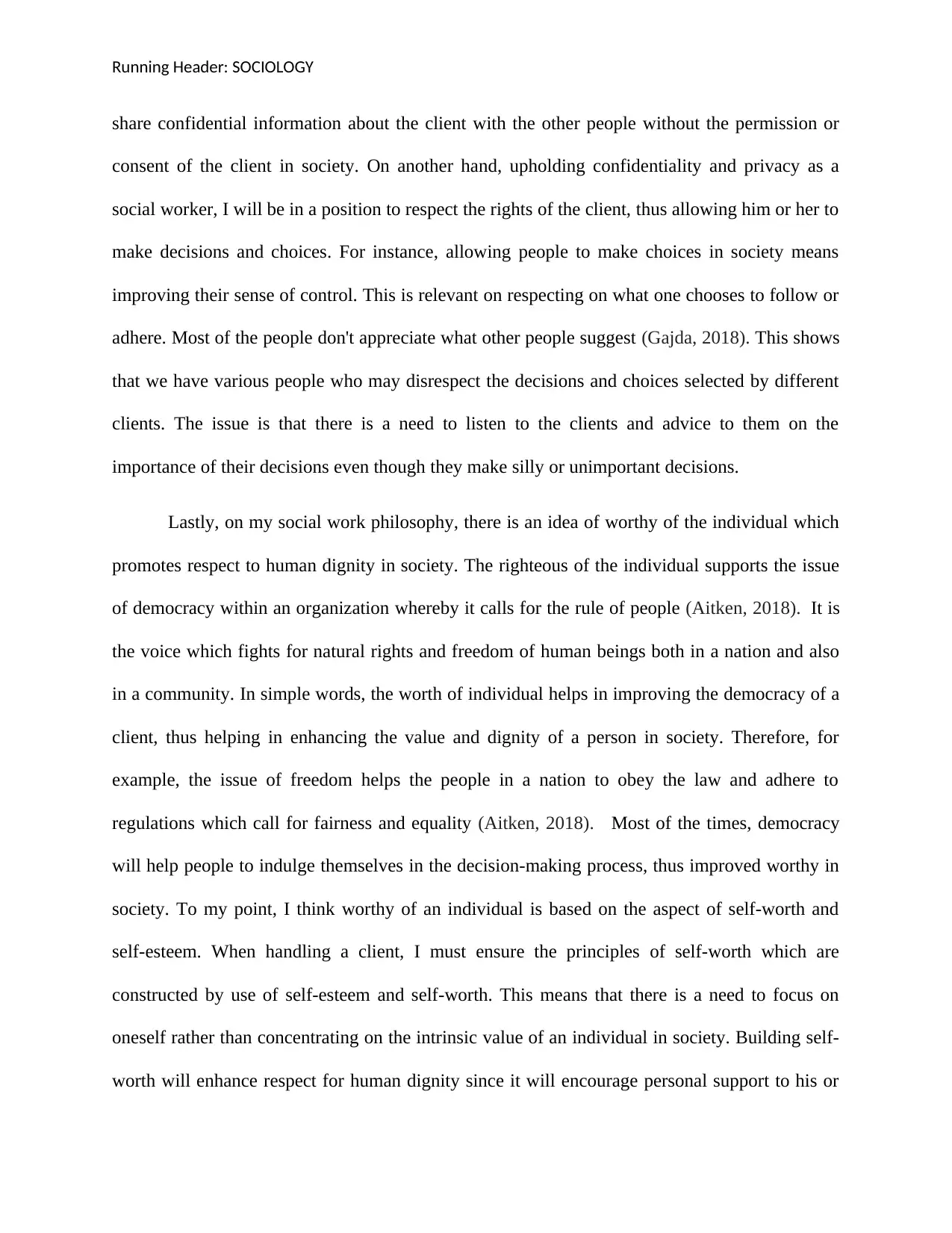
Running Header: SOCIOLOGY
share confidential information about the client with the other people without the permission or
consent of the client in society. On another hand, upholding confidentiality and privacy as a
social worker, I will be in a position to respect the rights of the client, thus allowing him or her to
make decisions and choices. For instance, allowing people to make choices in society means
improving their sense of control. This is relevant on respecting on what one chooses to follow or
adhere. Most of the people don't appreciate what other people suggest (Gajda, 2018). This shows
that we have various people who may disrespect the decisions and choices selected by different
clients. The issue is that there is a need to listen to the clients and advice to them on the
importance of their decisions even though they make silly or unimportant decisions.
Lastly, on my social work philosophy, there is an idea of worthy of the individual which
promotes respect to human dignity in society. The righteous of the individual supports the issue
of democracy within an organization whereby it calls for the rule of people (Aitken, 2018). It is
the voice which fights for natural rights and freedom of human beings both in a nation and also
in a community. In simple words, the worth of individual helps in improving the democracy of a
client, thus helping in enhancing the value and dignity of a person in society. Therefore, for
example, the issue of freedom helps the people in a nation to obey the law and adhere to
regulations which call for fairness and equality (Aitken, 2018). Most of the times, democracy
will help people to indulge themselves in the decision-making process, thus improved worthy in
society. To my point, I think worthy of an individual is based on the aspect of self-worth and
self-esteem. When handling a client, I must ensure the principles of self-worth which are
constructed by use of self-esteem and self-worth. This means that there is a need to focus on
oneself rather than concentrating on the intrinsic value of an individual in society. Building self-
worth will enhance respect for human dignity since it will encourage personal support to his or
share confidential information about the client with the other people without the permission or
consent of the client in society. On another hand, upholding confidentiality and privacy as a
social worker, I will be in a position to respect the rights of the client, thus allowing him or her to
make decisions and choices. For instance, allowing people to make choices in society means
improving their sense of control. This is relevant on respecting on what one chooses to follow or
adhere. Most of the people don't appreciate what other people suggest (Gajda, 2018). This shows
that we have various people who may disrespect the decisions and choices selected by different
clients. The issue is that there is a need to listen to the clients and advice to them on the
importance of their decisions even though they make silly or unimportant decisions.
Lastly, on my social work philosophy, there is an idea of worthy of the individual which
promotes respect to human dignity in society. The righteous of the individual supports the issue
of democracy within an organization whereby it calls for the rule of people (Aitken, 2018). It is
the voice which fights for natural rights and freedom of human beings both in a nation and also
in a community. In simple words, the worth of individual helps in improving the democracy of a
client, thus helping in enhancing the value and dignity of a person in society. Therefore, for
example, the issue of freedom helps the people in a nation to obey the law and adhere to
regulations which call for fairness and equality (Aitken, 2018). Most of the times, democracy
will help people to indulge themselves in the decision-making process, thus improved worthy in
society. To my point, I think worthy of an individual is based on the aspect of self-worth and
self-esteem. When handling a client, I must ensure the principles of self-worth which are
constructed by use of self-esteem and self-worth. This means that there is a need to focus on
oneself rather than concentrating on the intrinsic value of an individual in society. Building self-
worth will enhance respect for human dignity since it will encourage personal support to his or
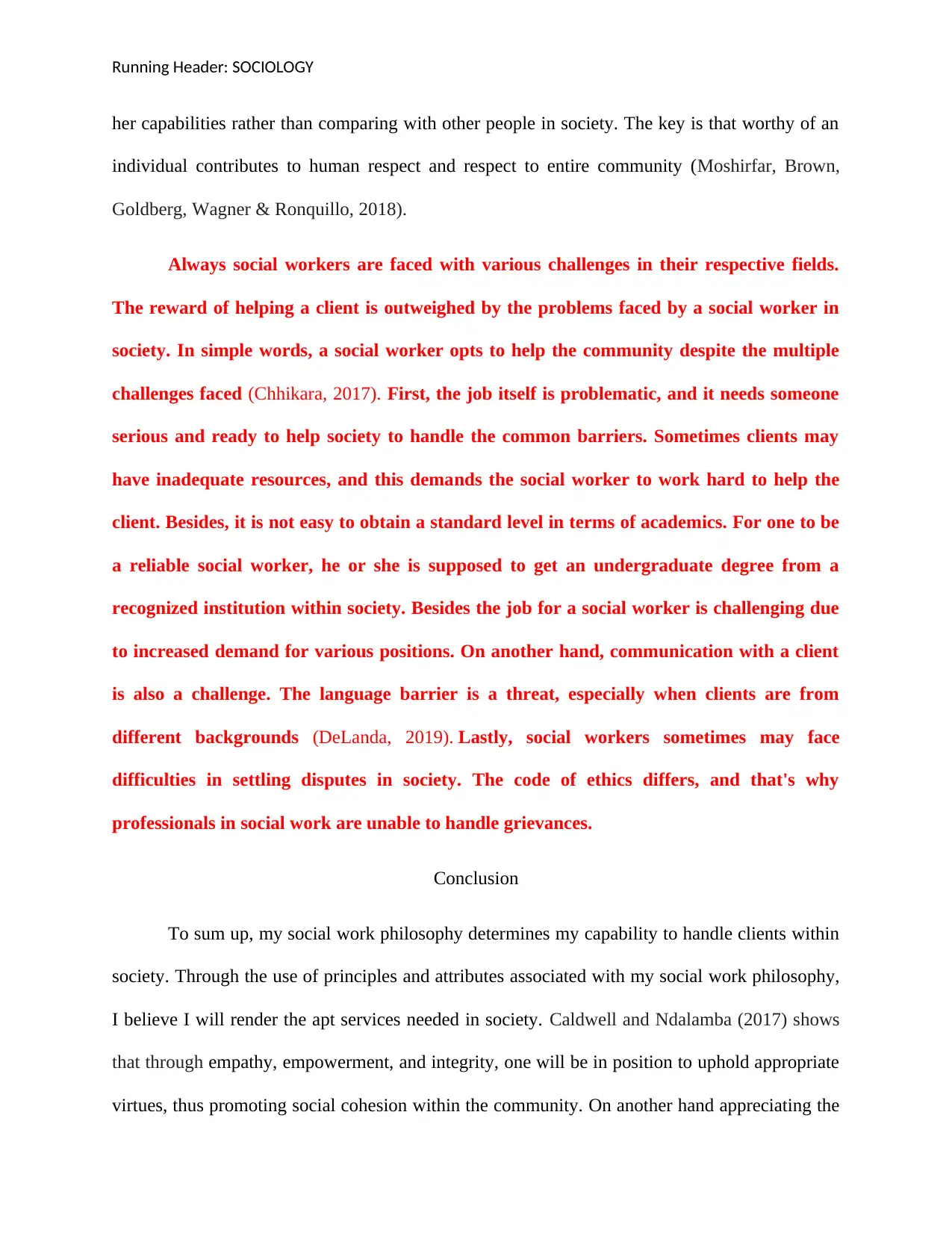
Running Header: SOCIOLOGY
her capabilities rather than comparing with other people in society. The key is that worthy of an
individual contributes to human respect and respect to entire community (Moshirfar, Brown,
Goldberg, Wagner & Ronquillo, 2018).
Always social workers are faced with various challenges in their respective fields.
The reward of helping a client is outweighed by the problems faced by a social worker in
society. In simple words, a social worker opts to help the community despite the multiple
challenges faced (Chhikara, 2017). First, the job itself is problematic, and it needs someone
serious and ready to help society to handle the common barriers. Sometimes clients may
have inadequate resources, and this demands the social worker to work hard to help the
client. Besides, it is not easy to obtain a standard level in terms of academics. For one to be
a reliable social worker, he or she is supposed to get an undergraduate degree from a
recognized institution within society. Besides the job for a social worker is challenging due
to increased demand for various positions. On another hand, communication with a client
is also a challenge. The language barrier is a threat, especially when clients are from
different backgrounds (DeLanda, 2019). Lastly, social workers sometimes may face
difficulties in settling disputes in society. The code of ethics differs, and that's why
professionals in social work are unable to handle grievances.
Conclusion
To sum up, my social work philosophy determines my capability to handle clients within
society. Through the use of principles and attributes associated with my social work philosophy,
I believe I will render the apt services needed in society. Caldwell and Ndalamba (2017) shows
that through empathy, empowerment, and integrity, one will be in position to uphold appropriate
virtues, thus promoting social cohesion within the community. On another hand appreciating the
her capabilities rather than comparing with other people in society. The key is that worthy of an
individual contributes to human respect and respect to entire community (Moshirfar, Brown,
Goldberg, Wagner & Ronquillo, 2018).
Always social workers are faced with various challenges in their respective fields.
The reward of helping a client is outweighed by the problems faced by a social worker in
society. In simple words, a social worker opts to help the community despite the multiple
challenges faced (Chhikara, 2017). First, the job itself is problematic, and it needs someone
serious and ready to help society to handle the common barriers. Sometimes clients may
have inadequate resources, and this demands the social worker to work hard to help the
client. Besides, it is not easy to obtain a standard level in terms of academics. For one to be
a reliable social worker, he or she is supposed to get an undergraduate degree from a
recognized institution within society. Besides the job for a social worker is challenging due
to increased demand for various positions. On another hand, communication with a client
is also a challenge. The language barrier is a threat, especially when clients are from
different backgrounds (DeLanda, 2019). Lastly, social workers sometimes may face
difficulties in settling disputes in society. The code of ethics differs, and that's why
professionals in social work are unable to handle grievances.
Conclusion
To sum up, my social work philosophy determines my capability to handle clients within
society. Through the use of principles and attributes associated with my social work philosophy,
I believe I will render the apt services needed in society. Caldwell and Ndalamba (2017) shows
that through empathy, empowerment, and integrity, one will be in position to uphold appropriate
virtues, thus promoting social cohesion within the community. On another hand appreciating the
⊘ This is a preview!⊘
Do you want full access?
Subscribe today to unlock all pages.

Trusted by 1+ million students worldwide
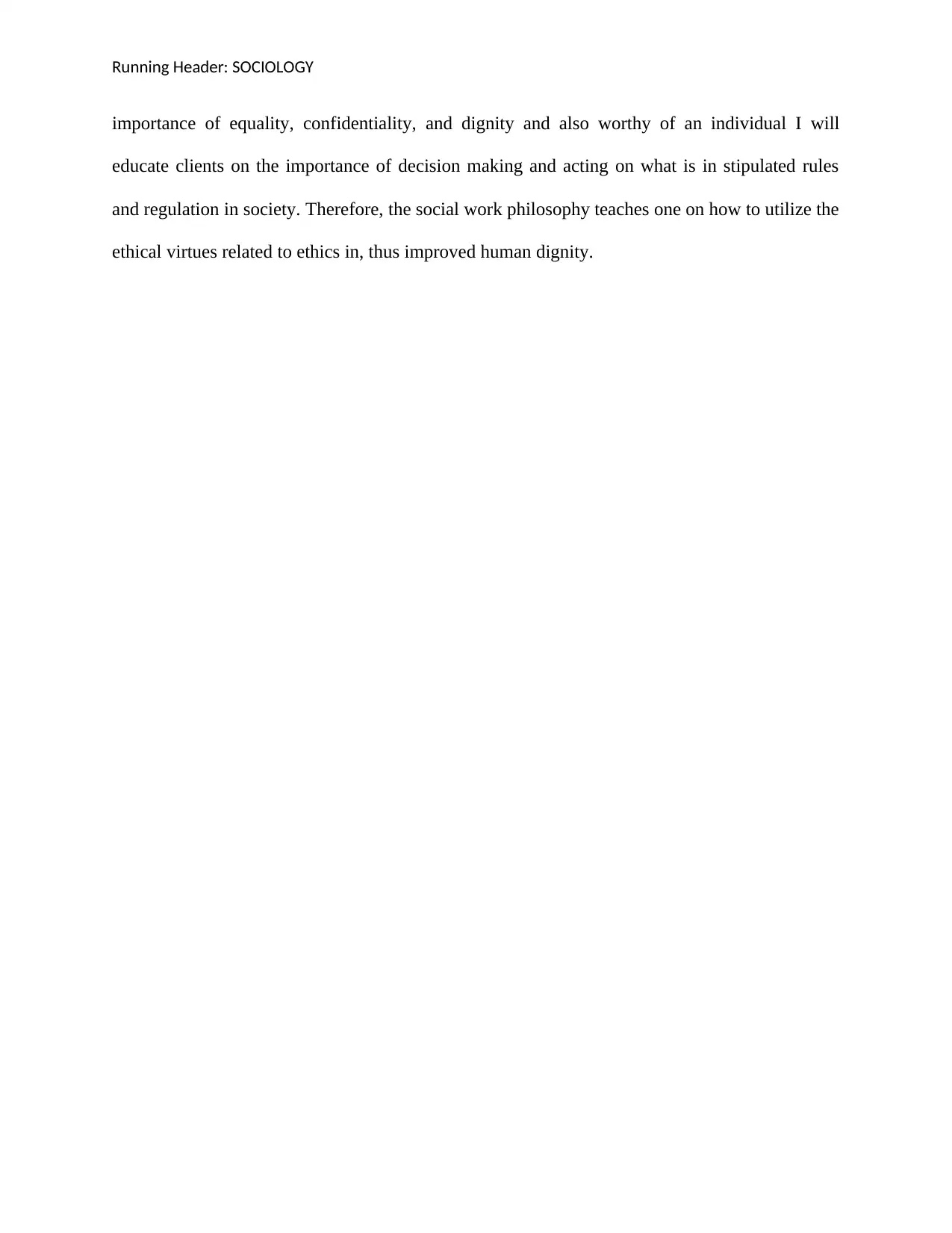
Running Header: SOCIOLOGY
importance of equality, confidentiality, and dignity and also worthy of an individual I will
educate clients on the importance of decision making and acting on what is in stipulated rules
and regulation in society. Therefore, the social work philosophy teaches one on how to utilize the
ethical virtues related to ethics in, thus improved human dignity.
importance of equality, confidentiality, and dignity and also worthy of an individual I will
educate clients on the importance of decision making and acting on what is in stipulated rules
and regulation in society. Therefore, the social work philosophy teaches one on how to utilize the
ethical virtues related to ethics in, thus improved human dignity.
Paraphrase This Document
Need a fresh take? Get an instant paraphrase of this document with our AI Paraphraser
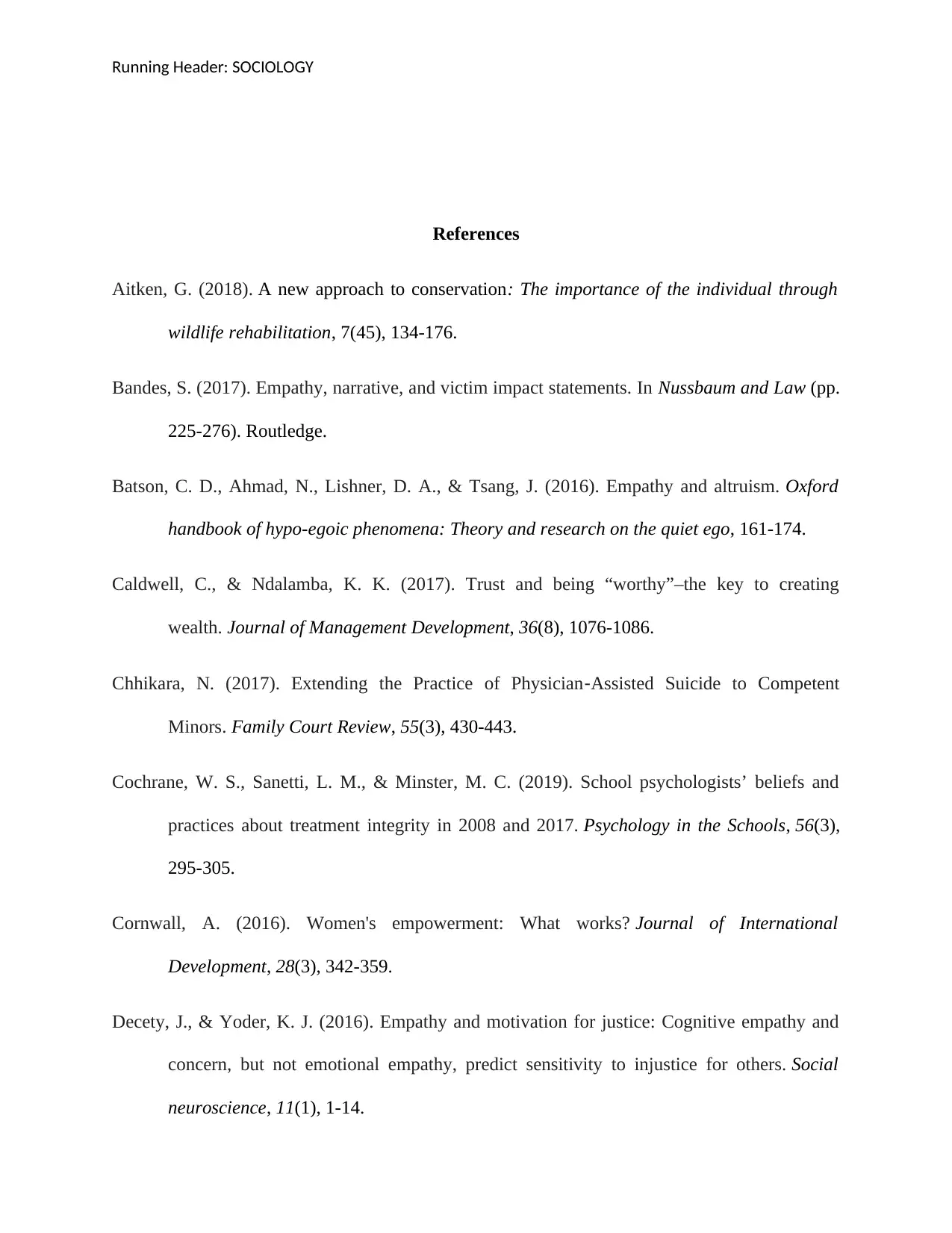
Running Header: SOCIOLOGY
References
Aitken, G. (2018). A new approach to conservation: The importance of the individual through
wildlife rehabilitation, 7(45), 134-176.
Bandes, S. (2017). Empathy, narrative, and victim impact statements. In Nussbaum and Law (pp.
225-276). Routledge.
Batson, C. D., Ahmad, N., Lishner, D. A., & Tsang, J. (2016). Empathy and altruism. Oxford
handbook of hypo-egoic phenomena: Theory and research on the quiet ego, 161-174.
Caldwell, C., & Ndalamba, K. K. (2017). Trust and being “worthy”–the key to creating
wealth. Journal of Management Development, 36(8), 1076-1086.
Chhikara, N. (2017). Extending the Practice of Physician‐Assisted Suicide to Competent
Minors. Family Court Review, 55(3), 430-443.
Cochrane, W. S., Sanetti, L. M., & Minster, M. C. (2019). School psychologists’ beliefs and
practices about treatment integrity in 2008 and 2017. Psychology in the Schools, 56(3),
295-305.
Cornwall, A. (2016). Women's empowerment: What works? Journal of International
Development, 28(3), 342-359.
Decety, J., & Yoder, K. J. (2016). Empathy and motivation for justice: Cognitive empathy and
concern, but not emotional empathy, predict sensitivity to injustice for others. Social
neuroscience, 11(1), 1-14.
References
Aitken, G. (2018). A new approach to conservation: The importance of the individual through
wildlife rehabilitation, 7(45), 134-176.
Bandes, S. (2017). Empathy, narrative, and victim impact statements. In Nussbaum and Law (pp.
225-276). Routledge.
Batson, C. D., Ahmad, N., Lishner, D. A., & Tsang, J. (2016). Empathy and altruism. Oxford
handbook of hypo-egoic phenomena: Theory and research on the quiet ego, 161-174.
Caldwell, C., & Ndalamba, K. K. (2017). Trust and being “worthy”–the key to creating
wealth. Journal of Management Development, 36(8), 1076-1086.
Chhikara, N. (2017). Extending the Practice of Physician‐Assisted Suicide to Competent
Minors. Family Court Review, 55(3), 430-443.
Cochrane, W. S., Sanetti, L. M., & Minster, M. C. (2019). School psychologists’ beliefs and
practices about treatment integrity in 2008 and 2017. Psychology in the Schools, 56(3),
295-305.
Cornwall, A. (2016). Women's empowerment: What works? Journal of International
Development, 28(3), 342-359.
Decety, J., & Yoder, K. J. (2016). Empathy and motivation for justice: Cognitive empathy and
concern, but not emotional empathy, predict sensitivity to injustice for others. Social
neuroscience, 11(1), 1-14.
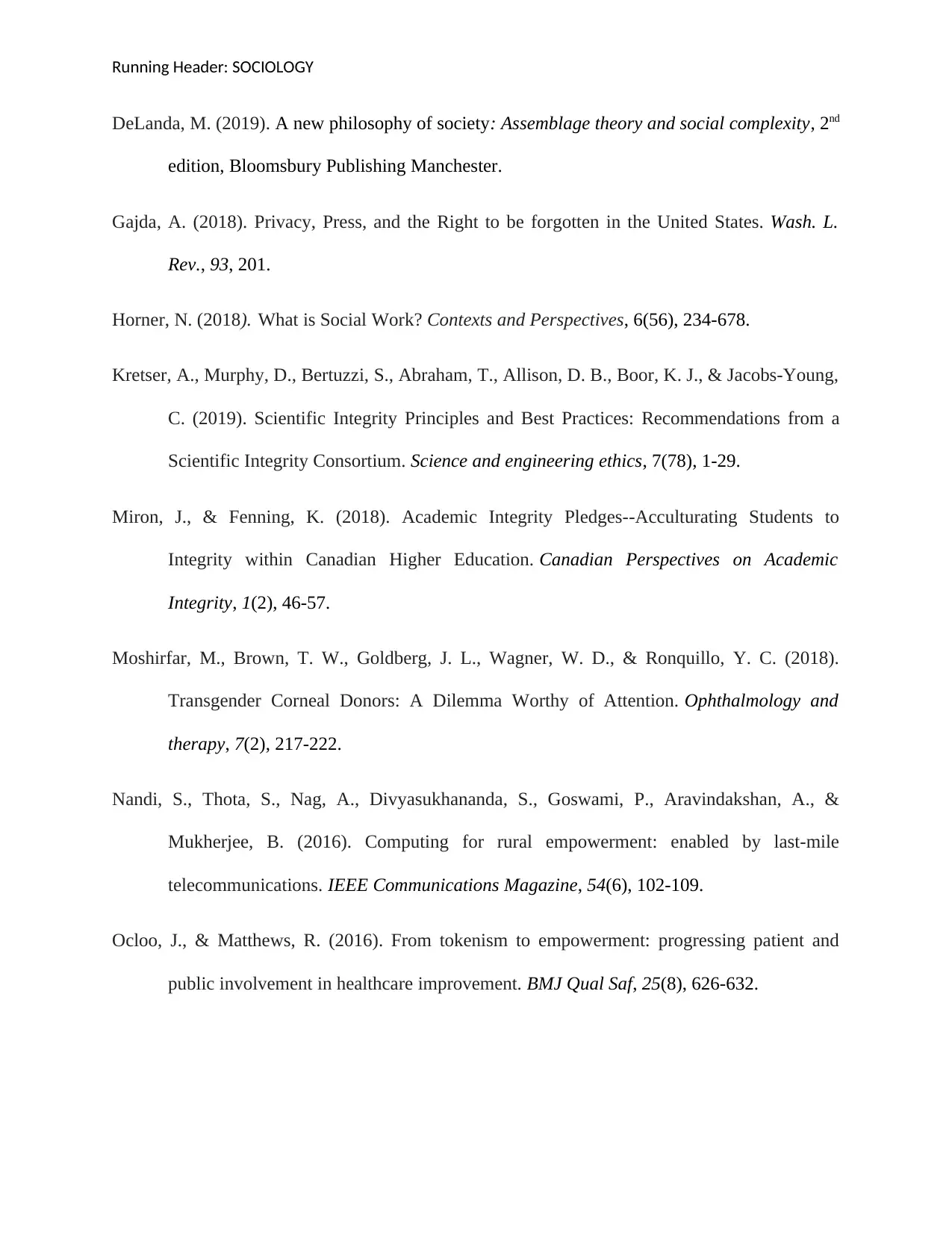
Running Header: SOCIOLOGY
DeLanda, M. (2019). A new philosophy of society: Assemblage theory and social complexity, 2nd
edition, Bloomsbury Publishing Manchester.
Gajda, A. (2018). Privacy, Press, and the Right to be forgotten in the United States. Wash. L.
Rev., 93, 201.
Horner, N. (2018). What is Social Work? Contexts and Perspectives, 6(56), 234-678.
Kretser, A., Murphy, D., Bertuzzi, S., Abraham, T., Allison, D. B., Boor, K. J., & Jacobs-Young,
C. (2019). Scientific Integrity Principles and Best Practices: Recommendations from a
Scientific Integrity Consortium. Science and engineering ethics, 7(78), 1-29.
Miron, J., & Fenning, K. (2018). Academic Integrity Pledges--Acculturating Students to
Integrity within Canadian Higher Education. Canadian Perspectives on Academic
Integrity, 1(2), 46-57.
Moshirfar, M., Brown, T. W., Goldberg, J. L., Wagner, W. D., & Ronquillo, Y. C. (2018).
Transgender Corneal Donors: A Dilemma Worthy of Attention. Ophthalmology and
therapy, 7(2), 217-222.
Nandi, S., Thota, S., Nag, A., Divyasukhananda, S., Goswami, P., Aravindakshan, A., &
Mukherjee, B. (2016). Computing for rural empowerment: enabled by last-mile
telecommunications. IEEE Communications Magazine, 54(6), 102-109.
Ocloo, J., & Matthews, R. (2016). From tokenism to empowerment: progressing patient and
public involvement in healthcare improvement. BMJ Qual Saf, 25(8), 626-632.
DeLanda, M. (2019). A new philosophy of society: Assemblage theory and social complexity, 2nd
edition, Bloomsbury Publishing Manchester.
Gajda, A. (2018). Privacy, Press, and the Right to be forgotten in the United States. Wash. L.
Rev., 93, 201.
Horner, N. (2018). What is Social Work? Contexts and Perspectives, 6(56), 234-678.
Kretser, A., Murphy, D., Bertuzzi, S., Abraham, T., Allison, D. B., Boor, K. J., & Jacobs-Young,
C. (2019). Scientific Integrity Principles and Best Practices: Recommendations from a
Scientific Integrity Consortium. Science and engineering ethics, 7(78), 1-29.
Miron, J., & Fenning, K. (2018). Academic Integrity Pledges--Acculturating Students to
Integrity within Canadian Higher Education. Canadian Perspectives on Academic
Integrity, 1(2), 46-57.
Moshirfar, M., Brown, T. W., Goldberg, J. L., Wagner, W. D., & Ronquillo, Y. C. (2018).
Transgender Corneal Donors: A Dilemma Worthy of Attention. Ophthalmology and
therapy, 7(2), 217-222.
Nandi, S., Thota, S., Nag, A., Divyasukhananda, S., Goswami, P., Aravindakshan, A., &
Mukherjee, B. (2016). Computing for rural empowerment: enabled by last-mile
telecommunications. IEEE Communications Magazine, 54(6), 102-109.
Ocloo, J., & Matthews, R. (2016). From tokenism to empowerment: progressing patient and
public involvement in healthcare improvement. BMJ Qual Saf, 25(8), 626-632.
⊘ This is a preview!⊘
Do you want full access?
Subscribe today to unlock all pages.

Trusted by 1+ million students worldwide
1 out of 13
Related Documents
Your All-in-One AI-Powered Toolkit for Academic Success.
+13062052269
info@desklib.com
Available 24*7 on WhatsApp / Email
![[object Object]](/_next/static/media/star-bottom.7253800d.svg)
Unlock your academic potential
Copyright © 2020–2025 A2Z Services. All Rights Reserved. Developed and managed by ZUCOL.





